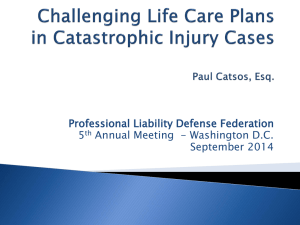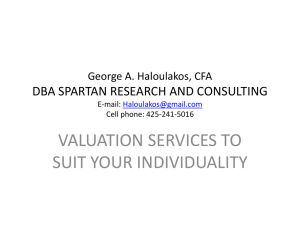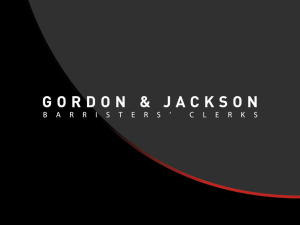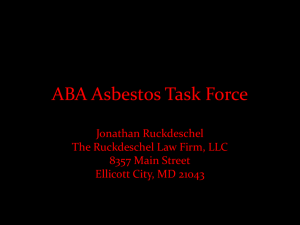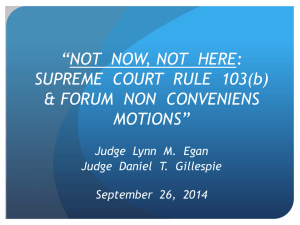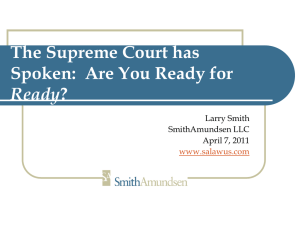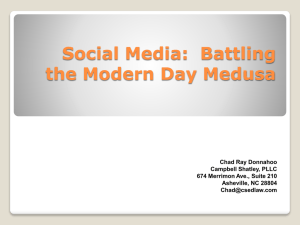IN THE CIRCUIT COURT FOR MONTGOMERY
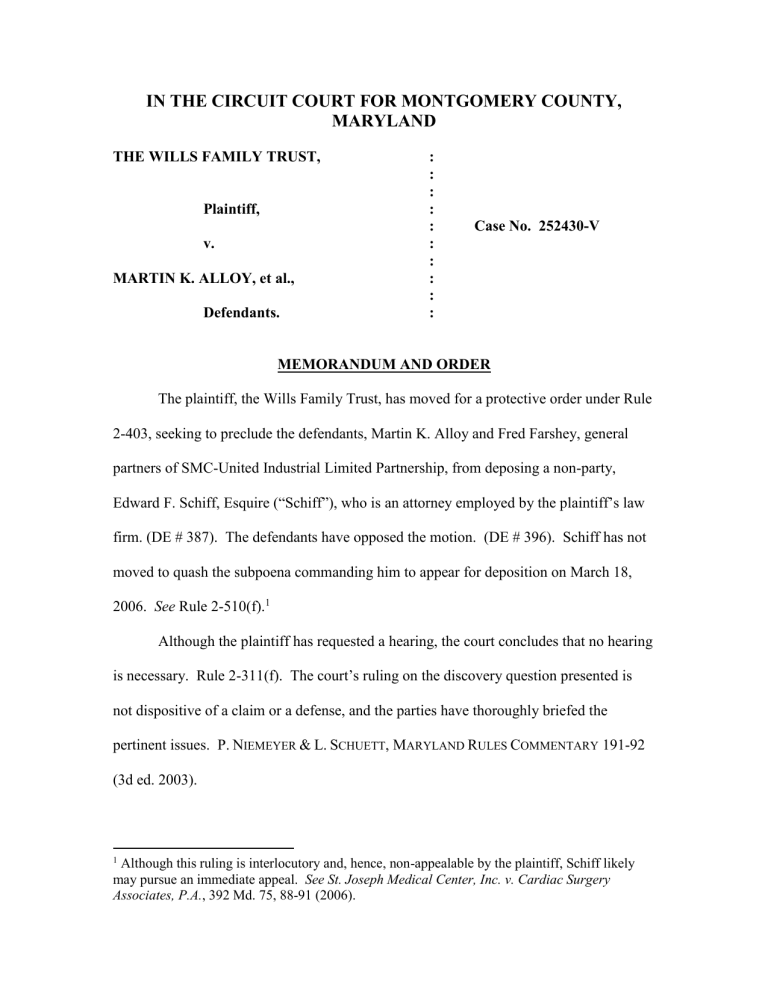
IN THE CIRCUIT COURT FOR MONTGOMERY COUNTY,
MARYLAND
THE WILLS FAMILY TRUST,
Plaintiff, v.
:
:
:
:
: Case No. 252430-V
MARTIN K. ALLOY, et al.,
Defendants.
:
:
:
:
:
MEMORANDUM AND ORDER
The plaintiff, the Wills Family Trust, has moved for a protective order under Rule
2-403, seeking to preclude the defendants, Martin K. Alloy and Fred Farshey, general partners of SMC-United Industrial Limited Partnership, from deposing a non-party,
Edward F. Schiff, Esquire (“Schiff”), who is an attorney employed by the plaintiff’s law firm. (DE # 387). The defendants have opposed the motion. (DE # 396). Schiff has not moved to quash the subpoena commanding him to appear for deposition on March 18,
2006. See Rule 2-510(f).
1
Although the plaintiff has requested a hearing, the court concludes that no hearing is necessary. Rule 2-311(f). The court’s ruling on the discovery question presented is not dispositive of a claim or a defense, and the parties have thoroughly briefed the pertinent issues. P.
N IEMEYER & L.
S CHUETT , M ARYLAND R ULES C OMMENTARY 191-92
(3d ed. 2003).
1 Although this ruling is interlocutory and, hence, non-appealable by the plaintiff, Schiff likely may pursue an immediate appeal. See St. Joseph Medical Center, Inc. v. Cardiac Surgery
Associates, P.A.
, 392 Md. 75, 88-91 (2006).
I.
The plaintiff’s Fourth Amended Complaint is the operative pleading in this case. (DE # 308). Count One alleges the perpetration of a multi-faceted freeze-out scheme by Alloy and Farshey designed to compel the plaintiff to sell its 38% interest in the SMC-United Industrial Limited Partnership for a fraction of its fair market value.
Count Two alleges that defendants Alloy and Farshey failed to fairly consider an offer by Sheridan Development Company, LLC (“Sheridan”), in August 2005, to buy partnership property for $48.9 million. Count Three is similar to Count Two. This count alleges that the defendants gave inadequate consideration to a $48 million offer to purchase partnership property made by BECO Management, Inc. (“BECO”), in
September 2005.
Count Four alleges that the defendants did not give good-faith consideration to the plaintiff’s buy-sell offer in May 2006 to purchase their share of the limited partnership for $15.8 million. Count Five alleges that Alloy and Farshey have continued to improperly compete with the limited partnership by owning certain warehouse properties.
The plaintiff seeks $11.3 million in compensatory damages and a panoply of equitable relief.
The defendants seek to depose Schiff because, they contend, he played a significant role in the plaintiff’s negotiation of the 2005 offers by Sheridan and BECO to purchase property from the limited partnership. Schiff has, according to the defendants, important factual information about these offers which are the subject of the claims advanced by the plaintiff in Count Two and Count Three of the Fourth Amended
Complaint. The defendants contend that discovery to date has revealed that Schiff
2
personally participated in meetings and other direct communications with representatives of Sheridan and BECO and, in some instances, was the sole representative of the plaintiff in communicating with these third-parties. According to the defendants, they learned of
Schiff’s role in the negotiations from Joel Fernebok, a principal of Sheridan, and James
Lystad, an in-house attorney for BECO. The defendants aver that the plaintiff did not disclose Schiff’s role, or any of Schiff’s contacts with Sheridan and BECO, in either its initial or supplemental responses to the defendant’s interrogatories.
The plaintiff contends that Schiff should not be deposed for a number of reasons.
First, the plaintiff notes that Schiff is a partner at one of the two law firms that represent the plaintiff in this litigation and, for many years; Schiff has provided the plaintiff with legal advice regarding its ownership interest in the limited partnership. They argue that any deposition of Schiff necessarily would have a chilling effect on their attorney-client relationship and, moreover, would likely imperil attorney work product during deposition preparation and possibly lead to an inadvertent disclosure during the deposition. See
Hickman v. Taylor , 329 U.S. 495, 501-14 (1947)(protecting attorney work product from broad discovery).
Second, the plaintiff contends that the defendants failed to carry their burden under Shelton v. American Motors Corp ., 805 F.2d 1312 (8 th
Cir. 1986), to show that: (1)
Schiff in fact has relevant, non-privileged information; (2) the information Schiff has cannot be obtained from any other source; and (3) the information sought is crucial to the defendants’ case. Finally, the plaintiff contends that the defendants can learn all they need to know about the Sheridan and BECO offers from sources other than one of its lawyers.
3
II.
Rule 2-402(a) allows a party to obtain discovery of any non-privileged information, “if the matter sought is relevant to the subject matter of the action, whether it relates to the claim or defense of the party seeking discovery or the claim or defense of any other party.” The Court of Appeals has repeatedly noted that the scope of discovery in Maryland is quite broad. See, e.g., Rodriguez v. Clarke , 400 Md. 39, 57 (2007); Food
Lion, Inc. v. McNeill , 393 Md. 715, 717-19 (2006). This broad scope applies to depositions, as well as paper discovery. Hallman v. Gross , 190 Md. 563, 574 (1948); see also Schlagenhauf v. Holder , 379 U.S. 104, 114-15 (1964).
2
Rule 2-403(a) allows a court, on motion, to restrict the scope of discovery otherwise permitted under Rule 2-402(a). Under Rule 2-403(a), the court may enter a protective order “to protect a party from annoyance, embarrassment, oppression, or undue burden or expense.” P.
N IEMEYER & L.
S CHUETT , M ARYLAND R ULES C OMMENTARY 282
(3d ed. 2003). The Maryland appellate courts look to Federal Rule 26 for guidance in construing Rule 2-403. Tanis v. Crocker , 110 Md. App. 559, 574-75 (1996); Blades v.
Woods , 107 Md. App. 178, 184-85 (1995).
The parties have not cited, and the court has not located, any reported Maryland appellate decision on the subject of deposing a party’s lawyers on non-privileged matters.
However, the Court of Special Appeals’ decision in
Forensic Advisors, Inc. v. Matrixx
Initiatives, Inc ., 170 Md. App. 520 (2006), provides important guidance. In that case, a
2 All experienced litigators know that oral examination is a superior method of truth seeking rather than simply relying on an opponent’s written answers to interrogatories.
See Mill-Run
Tours, Inc. v. Khashoggi , 124 F.R.D. 547, 549-50 (S.D.N.Y. 1989); Greenberg v. Safe Lighting
Inc ., 24 F.R.D. 410, 411 (S.D.N.Y. 1959). Moreover, even if a putative deponent has submitted a declaration averring lack of knowledge, a party still is entitled to test these assertions by oral examination. See Nakash v. U.S. Department of Justice , 128 F.R.D. 32, 35 (S.D.N.Y. 1989).
4
party to an Arizona lawsuit issued a deposition subpoena to a Maryland corporation that published a newsletter. The corporation sought to quash the subpoena in its entirety, and to preclude the taking of the deposition, on the ground that the information it possessed was privileged from disclosure under the statutory news media privilege established by
§ 9-112 of the Courts & Judicial Proceedings Article. The circuit court declined to quash the subpoena or to prohibit the taking of the deposition. The corporation appealed and the circuit court’s decision was affirmed.
Speaking for the intermediate appellate court, then Chief Judge Joseph Murphy
(now a member of the Court of Appeals) held that the circuit court did not err or abuse its discretion in declining to quash the subpoena because the deponent could assert the news media privilege in response to specific questions posed at the deposition. The person asserting the privilege was reminded to comply with Guideline 6 of the Maryland
Discovery Guidelines (requirements for the assertion of a privilege), and the questioner was reminded to conduct the deposition consistent with Rule 2-425(h)(requiring the proponent of a question to complete the examination to the extent practicable before moving to compel when confronted with a deponent’s refusal to answer a question).
Forensic Advisors, Inc.
, 170 Md. App. at 535-37.
III.
Before reaching the merits of the plaintiff’s motion for a protective order it is important to delineate what this case does and does not concern. First, the defendants seek to depose Schiff only as to non-privileged matters, such as information he shared and communications he had with third-parties, Sheridan and BECO. The plaintiff has not contended that Schiff’s communications with Sheridan and BECO are privileged.
See
5
Upjohn v. United States, 449 U.S. 383, 395-96 (1981); E.I. du Pont de Nemours & Co .
v.
Forma-Pack Inc.
, 351 Md. 396, 416-17 (1989). At least at this juncture, the defendants disclaim any interest in questioning Schiff about matters that are protected by the attorney-client privilege or the work product doctrine. See E.I. du Pont de Nemours &
Co .
v. Forma-Pack Inc.
, 351 Md. at 406-412; see also Parler & Wobber v. Miles &
Stockbridge , 359 Md. 671, 690-93 (2000).
Second, there has not been, to date, any contention by the defendants that a privilege (or the work product doctrine) has been waived as a result of Schiff’s communications with Sheridan or BECO. Compare In re Martin Marietta Corp.
, 856
F.2d 619 (4th Cir. 1988); In re Grand Jury Proceedings , 727 F.2d 1352 (4th Cir.
1984)(subject matter waiver) with Elkton Care Ctr. Associates v. Quality Care Mgmt.,
Inc., 145 Md. App. 532, 545 (2002)(limited waiver in the context of alleged inadvertent disclosure); see also Newman v. State , 384 Md. 285 (2004)(crime-fraud exception).
As a consequence, the court is now presented only with the following question: should a party’s lawyer, who is not trial counsel, be required to give a deposition as to non-privileged matters when the questioning’s focus will be the factual basis of claims for relief that have been specifically set forth in a complaint by his client? The decisions of the federal courts on whether a party’s lawyer can or should be deposed under these circumstances are far from uniform.
At one end of the spectrum is the decision of the United States Court of Appeals for the Eighth Circuit in Shelton v. American Motors Corp ., 805 F.2d 1323 (8th Cir.
1986), which imposes a fairly rigid set of hurdles the proponent must overcome before being allowed to depose a party’s lawyer.
Id.
at 1328-29. Although
Shelton’s
categorical
6
approach was limited somewhat by the later decision in Pamida, Inc., v. E.S. Originals,
Inc ., 218 F.3d 726, 730-31 (8th Cir. 2002), the reasoning of Shelton has been cited approvingly by at least two other federal circuits. See Boughton v. Cotter Corp ., 65 F.3d
823, 830-31 (10th Cir. 1995); Nguyen v. Excel Corp ., 197 F.3d 200, 2008-09 (5th Cir.
1999). The reasoning of Shelton has been used by a host of district courts to preclude any deposition of a party’s lawyer, even as to non-privileged matters.
See, e.g., SEC v. SBM
Investment Certificates, Inc., 2007 U.S. Dist. LEXIS 12685 (D. Md. 2007); Dunkin’
Donuts, Inc., v. Mandorico, Inc ., 181 F.R.D. 208, 210 (D.P.R. 1998); Doubleday v. Ruh ,
149 F.R.D. 601, 613 (E.D. Cal. 1993); N.F.A. Corp. v. Riverview Narrow Fabrics, Inc .,
117 F.R.D. 83, 85-86 (M.D.N.C. 1987). But see Younger Mfg. Co. v. Kaenon, Inc., 247
F.R.D. 586, 588-89 (C.D. Cal. 2007); Nakash v. U.S. Department of Justice , 128 F.R.D.
32, 34 (S.D.N.Y. 1989).
At the other end of the spectrum is the more nuanced approach taken by the
United States Court of Appeals for the Second Circuit, which looks to the factors outlined in Federal Rule 26 and relies on the trial court’s exercise of informed discretion.
See In re Friedman , 350 F.3d 65, 72 (2d Cir. 2003); see also Calvin Klein Trademark Trust v.
Wachner , 124 F. Supp.2d 207, 210-11 (S.D.N.Y. 2000).
With deference and respect, and in the absence of binding appellate precedent, this circuit court declines to follow Shelton and its progeny. The court adopts, instead, the reasoning of In re Friedman and Calvin Klein because the analysis employed by those decisions is more consonant with the liberal discovery philosophy of Rule 2-402(a). See generally Younger Mfg. Co., 247 F.R.D. at 588-89 .
7
Having carefully reviewed the parties’ submissions, the court concludes that
Schiff’s non-privileged communications (oral and written) with Sheridan and BECO properly may be inquired into at oral deposition. Schiff is in a far better position than anyone else to testify as to exactly what he (and others who were present) told Sheridan and BECO (or gave to them) about a possible purchase of partnership property. To hold otherwise, would be tantamount to immunizing lawyers from ever being deposed as fact witnesses as to non-privileged matters involving their clients; even when those clients make claims in a lawsuit regarding those very non-privileged matters. See Boston Edison
Co. v. United States
, 75 Fed. Cl. 557, 563 (2007)(a party’s attorney who is a fact witness may be deposed as to non-privileged matters); see also Kaiser v. Mutual Life Ins. Co. of
New York
, 161 F.R.D. 378, 382 (S.D. Ind. 1994)(“Even cases in the
Shelton line recognize that, if an attorney is a witness of or actor in prelitigation conduct, he may be deposed the same as any other witness.”)
While it is true that the defendants have not explored every possible alternative source of this information, the court finds that the defendants have made reasonable efforts to explore a number of these alternative sources (including written discovery propounded to the plaintiff, depositions of parties and non-parties, and interviews with non-party witnesses). Despite these efforts, the defendants have been unable to obtain anything nearly as particularized as what Schiff could reasonably be expected to offer on the subjects of the Sheridan and BECO proposals at oral deposition. Importantly, the plaintiff did not disclose in its interrogatory answers anything of substance about its (or
Schiff’s) communications with Sheridan or BECO regarding the claims asserted in Count
Two and Count Three of the Fourth Amended Complaint. See Rule 2-421(b)(an
8
interrogatory answer “shall include all information available to the party directly or through agents, representatives, or attorneys.”) 3
Schiff unquestionably has knowledge of discoverable, non-privileged facts. The plaintiff does not deny that this is so. Moreover, it was the plaintiff who placed Schiff into this situation, and the plaintiff cannot now rely on the circumstance that Schiff is its attorney to preclude the defendants from discovering non-privileged information.
Counsel are reminded to make objections at the deposition consistent with
Guideline 6 of the Maryland Discovery Guidelines and to complete the deposition to the extent practicable before moving to compel. Forensic Advisors, Inc.
, 170 Md. App. at
535-37.
The plaintiff’s motion for a protective order is denied because the plaintiff has failed to carry its burden of showing good cause under Rule 2-403(a). IT IS SO
ORDERED this 23rd day of February, 2009.
____________________________
RONALD B. RUBIN, Judge
3 The fact that the plaintiff referred the defendants to documents in response to the interrogatories regarding Sheridan and BECO does not relieve it of its duty to fairly answer the questions propounded to it. “If the party providing the discovery has already derived the information from business records, the information derived must be provided.” P.
N IEMEYER & L.
S CHUETT ,
M ARYLAND R ULES C OMMENTARY 326 (3d ed. 2003).
9


